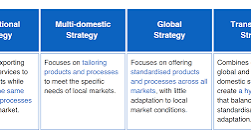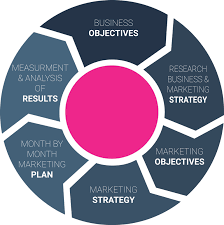The Key Elements of a Successful Business Expansion Strategy
Expanding a business is an exciting yet challenging endeavour that requires careful planning and strategic decision-making. A well-thought-out expansion strategy can help a company grow its market presence, reach new customers, and increase profitability. Here are some key elements to consider when developing a business expansion strategy:
Market Research
Before embarking on any expansion plans, it is crucial to conduct thorough market research to identify new opportunities and assess potential risks. Understanding the target market, competition, and consumer preferences will inform strategic decisions and help tailor the expansion strategy to meet specific needs.
Financial Planning
Expanding a business requires a significant investment of resources. Developing a detailed financial plan that outlines the costs involved, projected revenue streams, and potential return on investment is essential. Securing funding through loans, investors, or other means may be necessary to support the expansion efforts.
Talent Acquisition
As a business expands, hiring the right talent becomes crucial for success. Recruiting skilled employees who align with the company culture and possess the necessary expertise can drive growth and innovation. Building a strong team will enable the business to effectively execute its expansion strategy.
Operational Efficiency
Streamlining operations and improving efficiency are key components of a successful expansion strategy. Implementing scalable processes, leveraging technology solutions, and optimising supply chain management can help the business meet increased demand and maintain quality standards as it grows.
Marketing and Branding
An effective marketing and branding strategy is essential for promoting the expanded business to target audiences. Developing a strong brand identity, engaging in targeted marketing campaigns, and utilising digital channels can help raise awareness and attract new customers in new markets.
Risk Management
Expanding a business involves inherent risks that must be carefully managed. Conducting risk assessments, developing contingency plans, and monitoring performance metrics are critical aspects of risk management during the expansion process. Being prepared to adapt to unforeseen challenges is key to mitigating risks effectively.
Conclusion
A well-planned business expansion strategy encompasses various elements that work together to drive growth and success. By conducting thorough research, securing adequate resources, building a talented team, improving operational efficiency, implementing effective marketing initiatives, and managing risks proactively, businesses can navigate the complexities of expansion with confidence.
Eight Essential Tips for Successful Business Expansion Strategy
- Conduct thorough market research to identify new opportunities
- Develop a clear business expansion plan with specific goals and objectives
- Consider different modes of expansion such as franchising or partnerships
- Assess the financial implications and secure adequate funding for expansion
- Build a strong brand presence in new markets through targeted marketing strategies
- Ensure your operations and resources can support the expansion process
- Adapt your products or services to meet the needs of local markets
- Monitor progress regularly and be prepared to adjust strategies as needed
Conduct thorough market research to identify new opportunities
Conducting thorough market research is a crucial step in any business expansion strategy. By carefully analysing the market landscape, businesses can identify new opportunities for growth and development. Understanding the needs and preferences of target customers, as well as assessing the competitive landscape, enables companies to make informed decisions about expanding into new markets or diversifying their product offerings. Market research provides valuable insights that help businesses tailor their strategies to meet specific market demands, ultimately increasing the likelihood of success in their expansion efforts.
Develop a clear business expansion plan with specific goals and objectives
Developing a clear business expansion plan with specific goals and objectives is a fundamental tip for successful growth. By outlining detailed targets and milestones, a company can effectively chart its course towards expansion and ensure that all efforts are aligned towards achieving measurable outcomes. This strategic approach not only provides a roadmap for the business but also serves as a guiding framework for decision-making, resource allocation, and performance evaluation. Clarity in goals and objectives enhances focus, facilitates effective communication across teams, and enables the organisation to track progress towards its desired expansion outcomes.
Consider different modes of expansion such as franchising or partnerships
When formulating a business expansion strategy, it is beneficial to explore various modes of expansion, such as franchising or partnerships. These alternative approaches offer unique opportunities to leverage existing resources and expertise while mitigating risks associated with rapid growth. Franchising allows businesses to scale quickly by granting franchisees the rights to operate under an established brand, while partnerships enable collaboration with other entities to access new markets or capabilities. By considering different modes of expansion, companies can diversify their growth strategies and unlock new avenues for success in the competitive business landscape.
Assess the financial implications and secure adequate funding for expansion
Assessing the financial implications and securing adequate funding for business expansion is a critical step in ensuring the success of growth initiatives. By conducting a thorough analysis of the costs involved, projected revenue streams, and potential return on investment, companies can make informed decisions about their expansion strategy. Securing funding through loans, investors, or other financial sources enables businesses to access the necessary resources to support their growth plans and navigate any financial challenges that may arise during the expansion process. A solid financial foundation is essential for sustaining momentum and realising the full potential of business expansion efforts.
Build a strong brand presence in new markets through targeted marketing strategies
To successfully expand a business into new markets, it is essential to build a strong brand presence through targeted marketing strategies. By understanding the unique characteristics and preferences of the new market, businesses can tailor their marketing efforts to resonate with local consumers effectively. Implementing targeted campaigns that highlight the brand’s value proposition and differentiate it from competitors can help establish credibility and attract a loyal customer base. Consistent branding across various channels, coupled with engaging content and personalised messaging, can create a lasting impression and drive brand awareness in new markets.
Ensure your operations and resources can support the expansion process
To ensure the success of your business expansion strategy, it is crucial to verify that your current operations and resources are capable of supporting the growth process. Conducting a thorough assessment of your existing infrastructure, workforce, technology systems, and financial capabilities will help identify any gaps or constraints that may hinder expansion efforts. By proactively addressing operational and resource requirements, you can streamline the expansion process, maintain quality standards, and effectively scale your business to meet new demands and opportunities.
Adapt your products or services to meet the needs of local markets
Adapting your products or services to meet the specific needs of local markets is a crucial tip for successful business expansion. By tailoring offerings to align with the preferences, cultural nuances, and purchasing behaviours of different regions, businesses can enhance customer satisfaction and drive sales growth. Understanding and responding to the unique demands of local markets demonstrate a commitment to customer-centricity and can help establish a strong foothold in new territories. This strategic approach not only fosters brand loyalty but also positions the business for long-term success in diverse market environments.
Monitor progress regularly and be prepared to adjust strategies as needed
Monitoring progress regularly and being prepared to adjust strategies as needed are crucial aspects of a successful business expansion strategy. By keeping a close eye on key performance indicators and milestones, businesses can identify potential challenges early on and make timely adjustments to stay on course towards their expansion goals. Flexibility and adaptability are essential in responding to changing market dynamics and unforeseen obstacles, allowing companies to refine their strategies for optimal results. Regular monitoring and strategic adjustments enable businesses to navigate the complexities of expansion with agility and resilience, ensuring long-term growth and sustainability.



